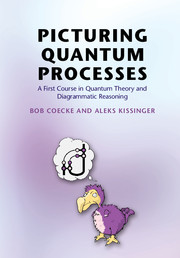Book contents
- Frontmatter
- Contents
- Preface
- 1 Introduction
- 2 Guide to Reading This Textbook
- 3 Processes as Diagrams
- 4 String Diagrams
- 5 Hilbert Space from Diagrams
- 6 Quantum Processes
- 7 Quantum Measurement
- 8 Picturing Classical-Quantum Processes
- 9 Picturing Phases and Complementarity
- 10 Quantum Theory: The Full Picture
- 11 Quantum Foundations
- 12 Quantum Computation
- 13 Quantum Resources
- 14 Quantomatic
- Appendix Some Notations
- References
- Index
13 - Quantum Resources
Published online by Cambridge University Press: 30 March 2017
- Frontmatter
- Contents
- Preface
- 1 Introduction
- 2 Guide to Reading This Textbook
- 3 Processes as Diagrams
- 4 String Diagrams
- 5 Hilbert Space from Diagrams
- 6 Quantum Processes
- 7 Quantum Measurement
- 8 Picturing Classical-Quantum Processes
- 9 Picturing Phases and Complementarity
- 10 Quantum Theory: The Full Picture
- 11 Quantum Foundations
- 12 Quantum Computation
- 13 Quantum Resources
- 14 Quantomatic
- Appendix Some Notations
- References
- Index
Summary
In my life, I have prayed but one prayer: oh Lord, make my enemies ridiculous. And God granted it.
– Voltaire, letter to Étienne Noël Damilaville, 1767Although bankers on Wall Street can have pretty much whatever they want in whatever quantity they want, this chapter is for the rest of us cheapskates. Throughout this book, we have assumed that we, like quantum bankers, have had access to whatever processes we need in whatever quantity. For instance, in teleportation, we assumed we could obtain Bell states at will and do joint measurements on pairs of systems. For non-locality, we assumed we had lots of GHZ states around, so we could make enough measurements to see our assumptions about locality cave in. And for MBQC, we assumed that we had huge graph states around to implement universal quantum computation.
As you might expect, these things ain't cheap! Quantum processes involving multiple systems typically take some very special equipment and many hours to implement. So, when it comes to such resources, it behooves one to think about doing as much as possible with as little as possible. This is of course true not just for quantum states, but for any kind of resource: coal, oil, nuclear, wind, and solar energy; certain chemicals; or just a bit of affection.
What is important about all resources is what we can do with them. If we think of the benefits of resources (e.g. warm, comfy houses or secure communication) as being resources themselves, we see that pretty much all questions about resources boil down to the following two:
1. Can a given resource be converted into some other resource?
2. How much of resource X to do we need to obtain resource Y?
These are exactly the questions a resource theory aims to answer.
One place this idea of ‘conversion of resources’ appears very explicitly is in the study of chemical reactions, where one finds expressions like these:
6CO2 + 6H2O + light -→ C6H12O6 + 6O2
C6H12O6 -→ 2C2H5OH + 2CO2
Such an expression tells us that we can convert the stuff on the LHS to the stuff on the RHS. Even though the expression doesn't provide any details about how this conversion is actually done, it does provide us with two very useful pieces of information.
- Type
- Chapter
- Information
- Picturing Quantum ProcessesA First Course in Quantum Theory and Diagrammatic Reasoning, pp. 737 - 789Publisher: Cambridge University PressPrint publication year: 2017



